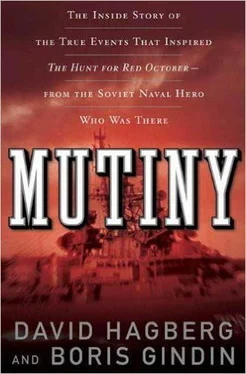Soccer is the national sport of the navy, if not of all the Soviet Union. The competition is fierce, as such things are among young military men, and in the end tournaments are held to see which ship will get the Bpk division award.
Those are the very best of times that Gindin remembers now. The Storozhevoy’s team is playing a very tight match when one of the midshipmen sprains his ankle. The game is stopped until the injured man can be helped off the field and brought back to the ship and a replacement player put in.
That evening Zampolit Sablin visits the midshipman’s quarters to make sure he’s not in too much pain and to ask if he needs anything. It’s almost surreal at this moment thinking about the incident. But Gindin can’t help himself; he’s fallen into another trough.
Across the street is the security guard at the main gate. Once you clear that point you are free to go into the town, which is right there on the other side of the fence. But it’s tiny, only three restaurants, two movie theaters, and a few stores spread out here and there. Plus the gaubvachta, the military prison, there to remind every man, officer and sailor alike, that the Soviet navy takes its regulations very seriously.
During the winter the chimneys constantly belch wood smoke, which fills the sharp, crisp air. The townspeople mostly stay indoors, so when it’s cold the streets are all but deserted. It feels like life has been halted in mid-step, waiting for the spring to return.
In the summer, however, the streets are filled with wives pushing baby carriages or taking the children to the park to play. Sometimes off-duty officers will go to the park, too, where they will mingle with the children and the locals.
Gindin remembers a town beach that everyone could use, civilians as well as naval personnel. But the only way to get to it was through the base, so everyone had to be cleared at the gate and driven down to the water.
Other than that there was almost nothing for the wives to do while their husbands were away at sea for six months at a stretch. It was only one of many reasons that the divorce rate among young officers was so high.
Nevertheless, thinking about Baltiysk gives Gindin a little warm feeling. The base is safe, the workload there is 10 percent of what it is at sea, and it’s where the Rossia, his favorite restaurant, is located. Food aboard a Soviet warship, even aboard the Storozhevoy and even for an officer, is not very good compared to the meals they can get ashore.
When the ship is at base and Gindin is not on leave, he and the other officers and crew are given a part of one day in four when they can go through the gate into town. The wives of some of the officers live in Baltiysk, and others take the train to the base whenever the Storozhevoy is in port. But for Gindin, who is single, the Rossia is the first place he heads for.
The restaurant is cozy and the lighting is dim and romantic, things that speak to a Russian’s soul. The Rossia is a place where a guy like Gindin can dream about a wife he’s yet to meet. Besides that, the food is fantastic and there’s always entertainment, someone playing a guitar and singing sad Russian folk songs.
Gindin is a regular customer, he tips very well, and he is obviously single. Every waitress in the always-crowded house loves him. There are always lines of people outside waiting to get in. Any spot inside will be fine. But when Gindin shows up, the waitresses scramble to get him a special place right in front of the singers. Even if every table is filled, one of the waitresses will race to the back room, grab one of the spares, and hustle it out to the floor for the lieutenant.
The crowds are usually split eighty-twenty between navy people and civilians. But everyone in Baltiysk serves the navy in one way or another, either in uniform or as a subcontractor or as a waitress in the Rossia. So every night the main topic of conversation in the packed restaurant is the navy. The faster the vodka flows, the faster the stories blossom, and the faster the guys grab any available girls and get up on the dance floor. As the noise level rises, so does the fun.
The Rossia is the place to be in Baltiysk. It has an atmosphere of relaxation and excitement. A secret place only a few hundred meters away from the ship that is light-years away from military duty, discipline, and responsibilities.
“Hey, Boris,” one of the waitresses calls when Gindin finally gets into the restaurant. She is carrying a table across the room, and he threads his way across the packed floor to where she sets it up.
She’s a pretty girl, with long blond hair, blue eyes, and a million-watt smile. She can afford to be extra nice; Boris would make a great catch. She brings him vodka, then herring and fried potatoes, pickles, stew, crusty bread, a quintessentially Russian supper, and he is in seventh heaven.
He has friends in the restaurant, and they have to wonder why he is getting such good service when they may have to wait for a drink or something to eat. But Boris is a regular, he’s an officer, he’s single, and he tips 30 percent.
That night in particular sticks out in Boris’s mind at this moment in the midshipmen’s dining hall, because of the warmth he felt. He was at peace with himself and the world. There were no difficult decisions to be made. No white or black backgammon piece to choose.
The waitress watches him that night, and at one point she comes over and lets him know that she gets off work at one in the morning. She’s interested. She would definitely like to spend some time with him. But it can’t happen. He has to be back aboard ship by midnight.
“Maybe another night,” Boris tells her.
She lowers her eyes in disappointment. “Sure, Boris,” she replies. She looks up and smiles. “May I get you another vodka?”
“Please,” he says.
After she leaves, he spots some friends, who join him for a few hours of fun. They’ve brought a girl, Olya, and everyone dances with her and sings and drinks and has something to eat. It’s not the most perfect night of his life to that point, but it sticks out in his mind right this moment, facing Zampolit Sablin and an absolutely insanely impossible choice.
Gindin’s thoughts are tumbling over one another now so fast it’s getting difficult to concentrate on any one thing, except for some crazy reason he fixates on how his fellow officers and sailors see him. It’s as if he’s looking at himself through the wrong end of a telescope. He’s way down at the end of the long tunnel, but he can’t make any sense of the details.
He’s always had what he feels is a good relationship with Captain Potulniy and just about everyone else aboard the ship. That includes the cook. But at this moment one incident sticks out in Gindin’s mind. He’s spent two days and nights fixing one of the diesel generators. He’s had little or no time to sleep, nothing substantial to eat, and he’s dead on his feet and hungry enough to eat a bear when he finally gets back to his cabin.
It’s late, well after the dinner hour, when he calls the officers’ galley and asks if the cook could send something up to his cabin.
“I’m sorry, Lieutenant, but dinner is done. All the food has been put away, all the dishes have been washed, and the galley will not be open again until morning.”
“Okay,” Boris says. “I understand.” He goes to bed hungry that night. It’s not the end of the world, but a little something to eat would have been nice.
As it happens, the very next day the cook rushes to Gindin’s cabin. There’s absolutely no water—hot or cold—with which to wash the dishes. “We have to carry all the dishes and all the pots and pans back to the crew’s galley, where they’ve got water,” the cook complains bitterly. “It’s damned hard work, Lieutenant.”
Читать дальше












